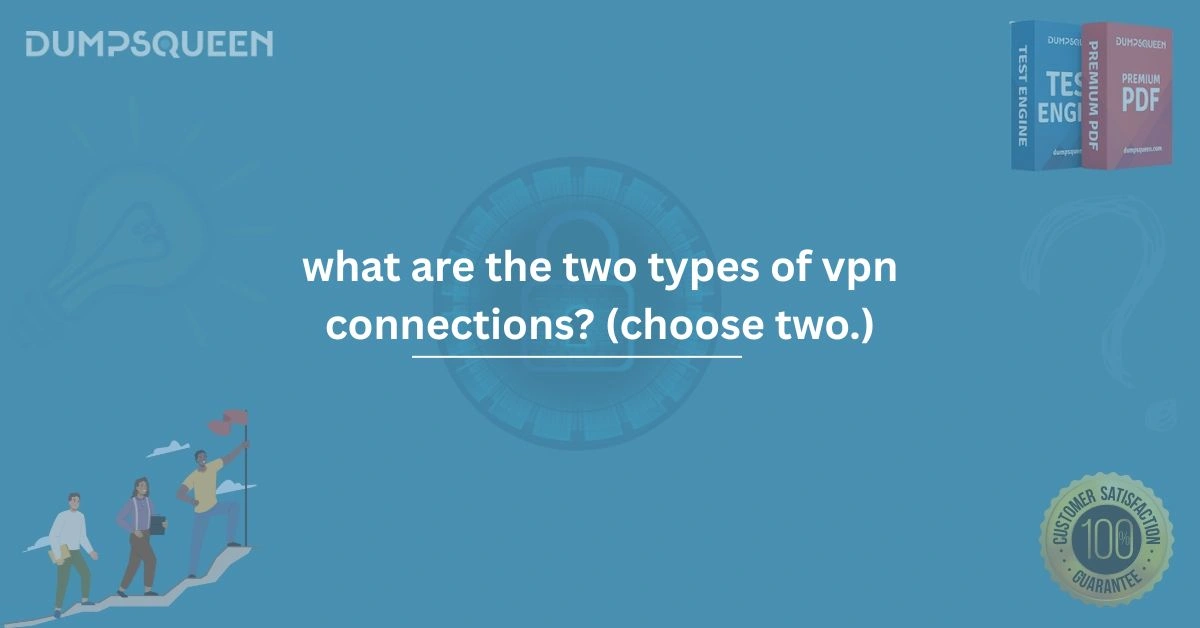Introduction
In an era where cybersecurity threats are evolving rapidly, Virtual Private Networks (VPNs) have become a cornerstone of secure digital communication. Whether you’re accessing corporate data from a remote location or simply trying to protect your identity while browsing the internet, VPN technology plays a critical role. Among the many questions asked during certification exams and technical interviews, one often arises: What are the two types of VPN connections? (Choose two.) This fundamental query is rooted in networking principles and is directly associated with the knowledge required for certifications like Cisco CCNA, CompTIA Network+, and others. As a leader in IT exam preparation materials, DumpsQueen strives to offer clear, exam-focused content that not only prepares candidates for real-world implementation but also for acing certification exams. In this blog, we will delve deep into the concept of VPNs, especially focusing on the two primary types of VPN connections. We’ll examine how they work, their roles in enterprise and personal environments, and why understanding this concept is crucial for IT professionals.
Understanding VPN Technology
Before answering what the two types of VPN connections are, it's essential to understand the foundation of VPN technology. A Virtual Private Network extends a private network across a public network, enabling users to send and receive data as if their computing devices were directly connected to the private network. The key features include encryption, authentication, and secure tunneling protocols. VPNs have become widely adopted in both enterprise and consumer sectors. For enterprises, VPNs offer remote access to internal resources, safeguarding sensitive data from external threats. For consumers, VPNs provide anonymity, help bypass geo-blocked content, and protect personal information while using public Wi-Fi.
The Role of VPNs in Today’s Network Infrastructure
As organizations expand geographically and offer flexible work-from-home policies, the demand for secure remote connectivity grows. VPNs serve as a secure bridge between remote employees and the company’s internal network. Whether connecting to cloud resources or accessing local intranet services, VPNs provide an encrypted tunnel that maintains confidentiality and integrity. Additionally, VPNs have become instrumental in bypassing censorship in restricted regions. Users in countries with internet limitations can access global services using VPNs, thereby preserving freedom of information. This level of functionality highlights the dual use of VPNs in both professional and personal settings.
What Are the Two Types of VPN Connections? (Choose Two.)
The question, "What are the two types of VPN connections? (Choose two.)", is frequently seen in various networking certification exams. The two main types of VPN connections are:
-
Remote Access VPN
-
Site-to-Site VPN
Both types offer secure communication but serve entirely different purposes within network architecture. Understanding the differences, implementation methods, and use cases of these two types is essential for aspiring networking professionals and exam-takers.
Remote Access VPN: A Closer Look
Remote Access VPN is designed for individual users who need to connect to a private network from a remote location. This type of VPN allows employees, students, or contractors to access internal resources securely using client software. Typically, a VPN client is installed on the user’s device, which authenticates and establishes an encrypted tunnel to the corporate network. In terms of protocol, Remote Access VPNs often use IPsec or SSL/TLS. The setup allows flexibility and is particularly beneficial for mobile workforces. Remote Access VPNs are scalable and can be configured for multi-factor authentication, increasing security and reducing the risk of unauthorized access. This VPN type is commonly used in educational institutions, healthcare environments, and corporate sectors where users frequently work from different geographical locations.
Site-to-Site VPN: Enterprise-Level Connectivity
Unlike Remote Access VPNs, Site-to-Site VPNs connect entire networks rather than individual clients. These are used when two or more physically separated networks need to communicate securely over the internet. This type of VPN is ideal for organizations with multiple office locations or branch offices that need to share resources across different geographic regions. Site-to-Site VPNs often utilize gateway-to-gateway encryption, where dedicated VPN appliances handle the traffic and secure communication. Once configured, users within each network can communicate as though they were on the same local network. This provides seamless access to centralized databases, applications, and services. This type of VPN connection is widely used in multinational corporations, government entities, and retail chains. It enables consistent communication, operational efficiency, and centralized management of resources.
Security Protocols and Encryption in VPNs
Both Remote Access and Site-to-Site VPNs rely on encryption protocols such as IPsec, SSL, and TLS to secure data transmission. These protocols ensure confidentiality, data integrity, and authentication, preventing unauthorized access or tampering. IPsec (Internet Protocol Security) is commonly used for Site-to-Site VPNs, while SSL/TLS is preferred in Remote Access scenarios due to its compatibility with web browsers and user-friendly setup. The choice of protocol depends on organizational needs, network infrastructure, and performance requirements.
Key Differences Between the Two Types of VPN Connections
While both VPN types offer secure data transmission, their deployment models, user access, and implementation differ significantly. Remote Access VPNs provide user-level access and are dynamic in nature, whereas Site-to-Site VPNs are more static, focusing on permanent connections between two or more networks. Another difference lies in client involvement. Remote Access VPNs require a VPN client, while Site-to-Site VPNs do not; the network gateways handle all the work, and end users typically don't need to do anything special to connect.
VPNs in Certification Exams: Importance of the Keyword
The keyword "what are the two types of VPN connections? (choose two.)" is not only vital from a conceptual perspective but also frequently appears in certification exams such as Cisco CCNA (200-301), CompTIA Security+, and Microsoft Azure Administrator exams. At DumpsQueen, we emphasize understanding such keywords because they are foundational in multiple networking and cybersecurity certifications. Mastering this topic can make the difference between passing and failing these high-stakes exams.
Real-World Application Scenarios
To understand VPNs in real-world settings, consider a healthcare organization with remote doctors. A Remote Access VPN allows physicians to securely access patient records from home. Conversely, a multinational law firm may use a Site-to-Site VPN to connect its New York and London offices, enabling shared case files and centralized billing systems. These examples illustrate how the two VPN types are employed across industries to facilitate secure, efficient communication.
Common Misconceptions About VPN Connections
A common misconception is that all VPNs work the same way. In reality, choosing the wrong VPN type for your needs can result in configuration issues, security risks, and inefficiencies. Some assume a Remote Access VPN is sufficient for connecting branch offices this leads to bandwidth bottlenecks and poor performance. It’s also important to note that VPNs do not provide complete anonymity or protect against all cyber threats. Proper configuration, usage of strong encryption, and integration with other security solutions like firewalls and IDS/IPS systems are essential for full protection.
Free Sample Questions
Question 1: What are the two types of VPN connections? (Choose two.)
A. Peer-to-Peer VPN
B. Remote Access VPN
C. Site-to-Site VPN
D. Hybrid VPN
Correct Answer: B and C
Question 2: Which VPN connection type allows individual users to securely connect to a private network from a remote location?
A. Site-to-Site VPN
B. SSL VPN
C. Remote Access VPN
D. IPsec VPN
Correct Answer: C
Question 3: A company with branch offices in different countries needs to securely connect their networks. Which type of VPN should they implement?
A. Remote Access VPN
B. Site-to-Site VPN
C. Client VPN
D. Peer VPN
Correct Answer: B
Question 4: Which VPN type typically uses a client application on a user's device to establish a secure tunnel to the central network?
A. Ethernet VPN
B. Site-to-Site VPN
C. Remote Access VPN
D. DMVPN
Correct Answer: C
DumpsQueen’s Commitment to Your Certification Success
At DumpsQueen, we recognize the importance of mastering fundamental networking concepts like VPNs for your exam and career success. Our expertly crafted practice exams, study guides, and real exam dumps cover high-priority keywords such as “what are the two types of VPN connections? (choose two.)” so you can be fully prepared for what the exam may throw at you. Whether you are preparing for Cisco, CompTIA, Microsoft, or any other major IT certification, DumpsQueen provides verified, accurate, and updated resources to ensure your learning journey is streamlined and effective.
Conclusion
VPNs have become a backbone of secure communications in our digitally connected world. The two primary types Remote Access VPN and Site-to-Site VPN serve distinct yet critical roles in both enterprise and personal settings. Understanding their differences, use cases, and configurations is essential for anyone pursuing a career in networking or cybersecurity. The keyword “what are the two types of VPN connections? (choose two.)” is not just a test question but a reflection of real-world knowledge that every IT professional must grasp. With resources from DumpsQueen, you are equipped with the tools, knowledge, and confidence to conquer this topic and succeed in your certification goals.




